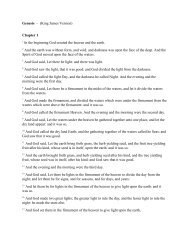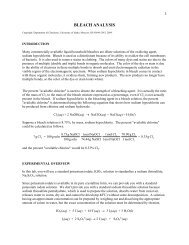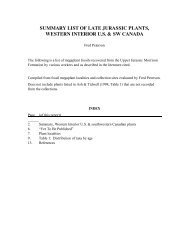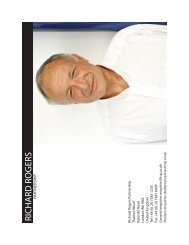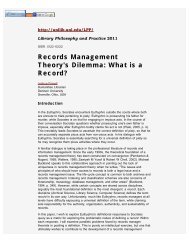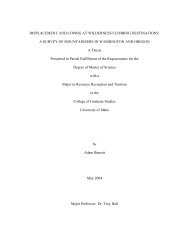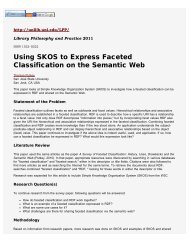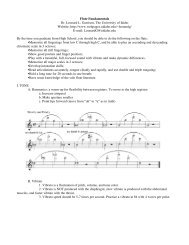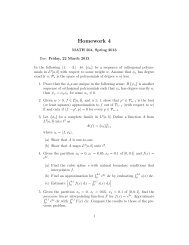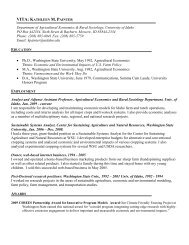Gandhi, Ahimsa, and the Self - University of Idaho
Gandhi, Ahimsa, and the Self - University of Idaho
Gandhi, Ahimsa, and the Self - University of Idaho
You also want an ePaper? Increase the reach of your titles
YUMPU automatically turns print PDFs into web optimized ePapers that Google loves.
appreciate, but not condone, <strong>G<strong>and</strong>hi</strong>'s relative ease in affirming both individualism <strong>and</strong> pan<strong>the</strong>ism at <strong>the</strong><br />
same time.<br />
Regarding <strong>the</strong> self, one might think that Christianity must have influenced <strong>G<strong>and</strong>hi</strong>'s views.<br />
Except for using <strong>the</strong> phrases "special creation <strong>of</strong> God" <strong>and</strong> "image <strong>of</strong> God," 18 this does not seem to<br />
have been <strong>the</strong> case. Iyer contends that <strong>the</strong> principal western influence on <strong>G<strong>and</strong>hi</strong> was Socrates, from<br />
whom he derived a view <strong>of</strong> an inviolable <strong>and</strong> fiercely independent conscience. (<strong>G<strong>and</strong>hi</strong> translated<br />
Plato's Apology into Gujarati.) In an impressive two-page analysis, Iyer demonstrates that <strong>the</strong>re is no<br />
Indian equivalent to Socrates' daimon, 19 an "inner voice" that claims, as <strong>G<strong>and</strong>hi</strong> said <strong>of</strong>ten during his<br />
campaigns, an authority higher than <strong>the</strong> laws <strong>of</strong> <strong>the</strong> l<strong>and</strong>.<br />
Iyer may be correct on this point, but it is not very clear if <strong>G<strong>and</strong>hi</strong>'s conscience is consistently<br />
Socratic. One passage on <strong>G<strong>and</strong>hi</strong>'s "Inner Voice" contains an odd mix <strong>of</strong> popular Christianity <strong>and</strong><br />
situation ethics: "The 'Inner Voice' may mean a message from God or from <strong>the</strong> Devil, for both are<br />
wrestling in <strong>the</strong> human breast. Acts determine <strong>the</strong> nature <strong>of</strong> <strong>the</strong> voice." 20 Ano<strong>the</strong>r passage gives<br />
<strong>G<strong>and</strong>hi</strong>an conscience an infallible divine sanction, independent <strong>of</strong> reason or result: "For me <strong>the</strong> Voice <strong>of</strong><br />
God, <strong>of</strong> Conscience, <strong>of</strong> Truth or <strong>the</strong> Inner Voice . . . mean one <strong>and</strong> <strong>the</strong> same thing . . . . For me <strong>the</strong><br />
Voice was more real than my own existence. It has never failed me, <strong>and</strong> for that matter, any one<br />
else." 21<br />
Bedekar contends that, when searching for a word for conscience, <strong>G<strong>and</strong>hi</strong> deliberately avoided<br />
<strong>the</strong> word atman <strong>and</strong> instead chose antaratman. Bedekar <strong>of</strong>fers his own translation from <strong>G<strong>and</strong>hi</strong>'s<br />
autobiography: ". . . But so long as I have not directly experienced this truth, till <strong>the</strong>n that which my inner<br />
self (antaratman) counts as true, that which is only conceived by me as true, will be counted by me as<br />
my support, my beacon, as <strong>the</strong> foundation for <strong>the</strong> course <strong>of</strong> my life." 22 This passage, besides confirming



